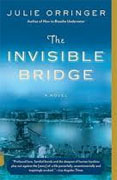The Invisible Bridge
Julie Orringer
book reviews:
· general fiction
· chick lit/romance
· sci-fi/fantasy
· graphic novels
· nonfiction
· audio books
· author interviews
· children's books @
curledupkids.com
· DVD reviews @
curledupdvd.com
newsletter
win books
buy online
links
home
for authors
& publishers
for reviewers

 |
The Invisible Bridge Julie Orringer Vintage Paperback 784 pages January 2011 |
|
The best literature makes us care deeply for the characters we read about. It is poetic in language, and often epic in scope. The best literature - like Jule Orringer’s breathtaking novel of war-torn lovers, family, survival, and romance, The Invisible Bridge
We read about Andras’s life and struggles as a Jew in Hungary, ostracized and mocked for being a Jew, in a Europe growing ever more anti-Semitic as it slouches onward toward the Second World War. There seems to be no possibility that he can escape his small provincial home town of Hársfa utca and his fate of running his father’s sawmill with his brothers when his father dies, but his drafting and illustrating skills at the magazine he works for, Past and Future, are noted by a fellow Hungarian and professor of architecture in Paris at the Ecole Speciale, and he is offered a scholarship. That is the only possible way he can afford the costs of the tuition, room, and board; even then, he and his family can barely afford to pay for the traveling expenses to get there. Before he leaves for Paris by train, Andras has a fortuitous encounter when he meets the wealthy Mrs. Hasz, who requests that he come over to her house and take a package with him to her son, also studying in Paris but at a different school there. Mrs. Hasz’s mother also asks Andras to deliver a letter when he arrives, not trusting that the mail is secure enough. Little is he aware that the letter he mails once he is in Paris is going to the residence of Klara Morgenstern/Hasz, Mrs. Hasz’s daughter, whom he will eventually meet, fall in love with, and marry. What struck me time and time again as I read The Invisible Bridge More than this, the author gets the nuances of the people’s expressions right, and she includes enough phrases in Hungarian and French that I was certain she must be fluent in both languages. All of these things and a thousand more immerse the reader in her novel and her characters’ lives. Nothing seems strained; her writing style is fluid, no jarring incongruous details or false steps in her narrative. The sense of hope and a promise for a better future that Andras feels, under the most trying and difficult circumstances of his life, how he continues to struggle on when others would have given up, also served to make me a fan of this novel. Orringer writes of war and romance, the invisible bridges that join us all, the bridges that span across the generations and make us who we are. If you are a lover of the finest literature - or just enjoy a cracking good novel set in war-torn Europe (primarily France) - find out for yourself why The Invisible Bridge Originally published on Curled Up With A Good Book at www.curledup.com. © Douglas R. Cobb, 2011 |
|
|
|
 Click here to learn more about this month's sponsor! |
|
| fiction · sf/f · comic books · nonfiction · audio newsletter · free book contest · buy books online review index · links · · authors & publishers reviewers |
|
| site by ELBO Computing Resources, Inc. | |
 What makes Orringer’s novel the great of a piece of literature that it is, one you’ll want to recommend to your family and friends? The breadth and the scope of the era, the backdrop of World War II, is one of the factors, and how masterfully the author
conveys the hopes and dreams her main character, Hungarian Jew Andras Levi, has for himself, his wife, Klara, and his brothers, Tibor and Matyas. Orringer’s prose in
What makes Orringer’s novel the great of a piece of literature that it is, one you’ll want to recommend to your family and friends? The breadth and the scope of the era, the backdrop of World War II, is one of the factors, and how masterfully the author
conveys the hopes and dreams her main character, Hungarian Jew Andras Levi, has for himself, his wife, Klara, and his brothers, Tibor and Matyas. Orringer’s prose in